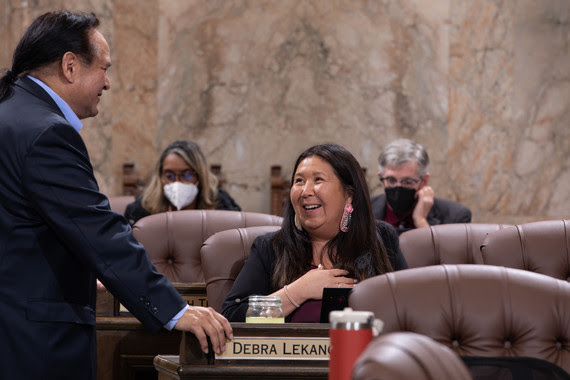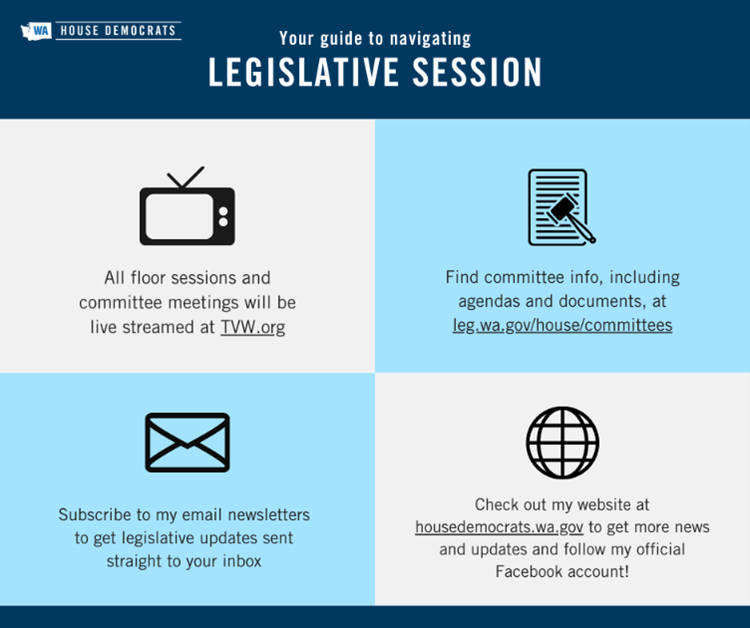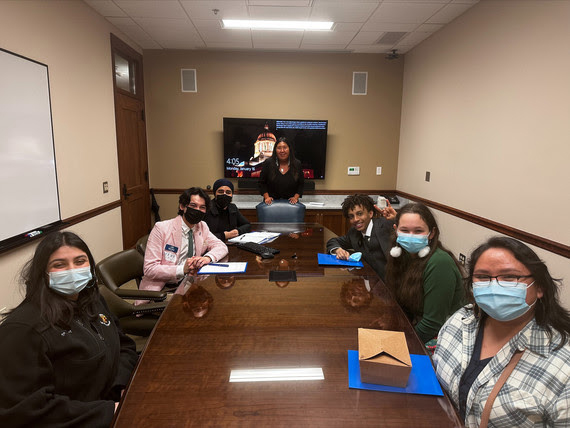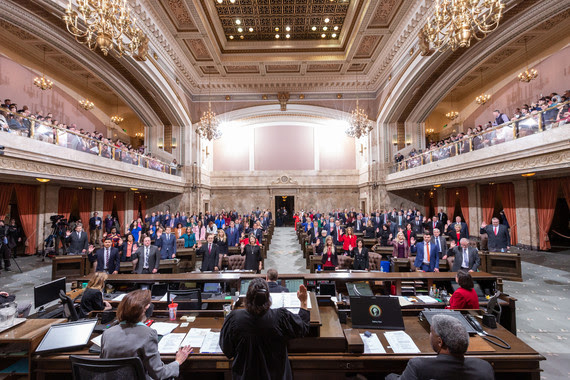||| |FROM THE OFFICE OF REP. DEBRA LEKANOFF |||
January 9th marked the beginning of the 2023 legislative session, and I am honored to return once again as your 40th Legislative District representative. This year, I will be serving on the House Agriculture and Natural Resources, Appropriations, Environment and Energy, and Rules committees.
For the first session since 2020, my colleagues and I will be working in-person, in Olympia. While this restores our opportunities to connect face-to-face, the COVID-19 pandemic has taught us new ways to communicate with one another and make democracy more accessible. We will continue to have virtual meeting and testimony options. All committee meetings and floor sessions will also be streamed live at tvw.org and remote testimony, which was such a success last session and allowed greater participation in the lawmaking process. I look forward to seeing many of you, both virtually and face-to-face, and hearing about your legislative priorities for our community, district, and state.
Here are some ways to stay engaged:
- Watch — TVW.org broadcasts all the debates and votes that happen in the House and Senate, along with committee meetings and other events you may be interested in. You can watch live or access recorded content.
- Research — Look up legislation by lawmaker or by topic.
- Learn — Learn about the legislative process, from start to finish.
- Testify — Committee testimony will continue to have a virtual option, so instead of driving to Olympia to weigh in on legislation during the committee process, you can continue to do so from home. Written testimony is also an option, and you can always share your story with me. Learn more about how to testify.
- Get in touch — You can reach my office by email at Debra.Lekanoff@leg.wa.gov or are welcome to call the legislative hotline number (toll free 800-562-6000). This year, we will accommodate in-person and virtual meetings. To schedule a meeting, please contact my Legislative Assistant, Devon McBride at Devon.McBride@leg.wa.gov.
Thank you for coming by my office!
Thanks so much to those of you who have already stopped by to visit—it’s been wonderful seeing you in-person once again—thanks for sharing your stories, ideas, advocacy, and priorities.
Thanks so much to those of you who have already stopped by to visit—it’s been wonderful seeing you in-person once again—thanks for sharing your stories, ideas, advocacy, and priorities.
Planned Parent Hood Teens from 40th District: Teen advocates visited with me and shared their priority legislative actions for the 2023 Session. This year, they’re asking for support with Shield Laws, which would protect the privacy and security of people seeking reproductive healthcare and gender affirming care. Shield Laws also protect providers offering these services. The teen advocates that I met with also advocated for the elimination of cost sharing requirements for patients seeking reproductive and gender affirming care, recognizing the barrier that cost can cause. My colleagues and I are working on a comprehensive package of bills to expand and protect reproductive care, including HB 1469, a Shield Law, and HB 1115, prohibiting cost sharing.
WHOOSHA: Representative Kretz and I learned about a new fish passage solution for fish that are faced with salmon barriers. Many may remember the astronomical mud slide on the Frasier River a few years ago, and I had the opportunity to work with Canadian Federal Government, US Army Corp of Engineers, British Columbia Provincial Government, and British Columbia First Nations to address solutions to salvaging a fish run that would have impacted thousands of fishers from the First Nation and Tribes, Commercial and Recreation. It was interesting to see how this salmon barrier option can be explored in our state and find a legislative nexus.
Jennifer Kilmer, WA State Historical Society: We have an opportunity to fund a WA State Native American Historical program at a State Museum. The opportunity provides to WA citizens the true history, as shared by WA Tribes. The First Washingtonians have collaborated with WA State Historical Society in a first time viewing of their culture and traditions.
The Washington State History Museum is creating a new permanent gallery focused on interpreting significant topics related to the impacts of settlement on Native peoples, as well as the many acts of resistance and resilience of Washington’s 29+ sovereign Tribal nations. Working with Native curators, as well as a nine person Native Advisory Committee, the museum’s goal is to develop a new permanent exhibition that will educate visitors on the sovereignty of Washington’s Tribes, as well as the enduring impacts of colonization on Tribal communities, both of which are essential components of Washington State history. As well, the gallery will serve as an important in-person learning laboratory in support of the state-mandated Since Time Immemorial curriculum. Fabrication costs for the exhibition are included in the Governor’s capital budget for the upcoming biennium.
WDFW provided an update on SB 557, from 2019: The current law requires recreational vessels to stay at least 300 yards from Southern Resident killer whales and at least 400 yards out of the path in front of and behind the whales. Vessels must also reduce their speed to seven knots within one-half nautical mile of Southern Residents. The new proposed bills in the House, HB 1145, and the Senate, SB 5371, support the 2022 WDFW Department recommendation to maintain the definition of commercial whale watching, but recommends changes to reduce the potential financial and administrative burden of the licensing and rules, further distinguishing between motorized commercial whale watching and non-motorized, guided paddle tours. While the report recommends a 1,000-yard buffer around Southern Residents, it doesn’t suggest any changes to commercial or recreational viewing of other, healthier populations such as Bigg’s killer whales, humpback whales, gray whales, or any other whale species currently in the area, which comprise most whale-watching opportunities in Washington.
WWU Students Lobby Day: We had Western Washington Students visit my office to share their priorities to support legislative actions for 2023. It has been an honor to have my students from this pristine University come down to Olympia.
wwu student lobby day
Some of my priorities this legislative session:
Throughout session, I’ll be sharing with you updates on various pieces of legislation and budget items that are of interest to our district and that I’m passionate about. Here’s a brief overview of the bills I’ve introduced this session:
Bills I’ve Prime Sponsored
HB 1555 requires that if the State seeks the extradition of Indigenous people from within the jurisdiction of a tribe, the state must comply with requirements of tribal extradition law.
HB 1399 establishes a Native American scholarship program in recognition of the historical traumas that have a lasting impact on Native populations, including education. Historically, education was used as a reformation tactic to strip away Native identity and culture to whitewash the Indigenous population and to separate Native children from their families, effectively destroying a population. Historically, education was used as a weapon. Today, Native Americans are one of the least represented populations in Washington’s universities and colleges: Native Americans face many barriers to education, such as poverty and a lack of postsecondary educational access near reservations. It is therefore the state’s duty to recognize historical truths and traumas and reinvest in Indigenous populations.
HB 1332 requires that all school districts incorporate a tribal sovereignty curriculum into their social studies curricula, including materials about the history, culture, and government of their nearest federally recognized tribes. This bill recognizes tribal history, culture, and government a necessary, essential, and important component of public education, addressing a massive gap. Erasure of Indigenous history and culture in education denies Indigenous people of space, resources, compassion, and understanding. Inclusion of Indigenous history and culture in education allows for greater historical transparency, celebration of culture, and increased Indigenous representation.
HB 1177 creates a Cold Case Investigations Unit within the Office of the Attorney General to assist law enforcement with solving cold cases involving missing and murdered Indigenous women and people. I bring my unique perspective as a Native woman while developing legislation. One of my top legislative priorities has always been to advocate for the safety of Indigenous people in Washington State. Too many Indigenous mothers, sisters, wives, and daughters have been torn from their families. Native women experience violence at much higher rates than the national average and are murdered at rates greater than 10 times the national average. Many of these cases are unsolved or even unreported. Last year, I championed legislation to develop a first-in-the-nation task force and alert system to help identify and locate missing Indigenous women and people. Under this new legislation, The Unit must prioritize assistance to jurisdictions that do not have sufficient resources to investigate cold cases. The Unit must include an advocate or case navigator whose primary function is to work with and maintain regular, consistent, and confidential communication with families of missing and murdered indigenous women and people, and to convey information between the investigators and families using culturally appropriate and trauma-informed practices.
Some of the Bills I’ve Co-Sponsored:
HB 1525 establishes and implements policies in the working connections childcare program to promote stability and quality of care for children from low-income households.
HB 1567 conducts an examination of the costs associated with conservation district elections under current law, and the projected costs and benefits for shifting conservation district elections.
HB 1129 supports manufactured homeowners by combining a longer notice of sale period with required written notice of opportunity to purchase. Programs like this are part of the multi-step and multi-tier work done to address housing shortages in Washington.
- HB 1332 requires that all school districts incorporate a tribal sovereignty curriculum into their social studies curricula, including materials about the history, culture, and government of their nearest federally recognized tribes. This bill recognizes tribal history, culture, and government a necessary, essential, and important component of public education, addressing a massive gap. Erasure of Indigenous history and culture in education denies Indigenous people of space, resources, compassion, and understanding. Inclusion of Indigenous history and culture in education allows for greater historical transparency, celebration of culture, and increased Indigenous representation.
- HB 1177 creates a Cold Case Investigations Unit within the Office of the Attorney General to assist law enforcement with solving cold cases involving missing and murdered Indigenous women and people. I bring my unique perspective as a Native woman while developing legislation. One of my top legislative priorities has always been to advocate for the safety of Indigenous people in Washington State. Too many Indigenous mothers, sisters, wives, and daughters have been torn from their families. Native women experience violence at much higher rates than the national average and are murdered at rates greater than 10 times the national average. Many of these cases are unsolved or even unreported. Last year, I championed legislation to develop a first-in-the-nation task force and alert system to help identify and locate missing Indigenous women and people. Under this new legislation, The Unit must prioritize assistance to jurisdictions that do not have sufficient resources to investigate cold cases. The Unit must include an advocate or case navigator whose primary function is to work with and maintain regular, consistent, and confidential communication with families of missing and murdered indigenous women and people, and to convey information between the investigators and families using culturally appropriate and trauma-informed practices.
Some of the Bills I’ve Co-Sponsored:
- HB 1525 establishes and implements policies in the working connections childcare program to promote stability and quality of care for children from low-income households.
- HB 1567 conducts an examination of the costs associated with conservation district elections under current law, and the projected costs and benefits for shifting conservation district elections.
- HB 1129 supports manufactured homeowners by combining a longer notice of sale period with required written notice of opportunity to purchase. Programs like this are part of the multi-step and multi-tier work done to address housing shortages in Washington.
A new tax credit for Washington workers starts in 2023!
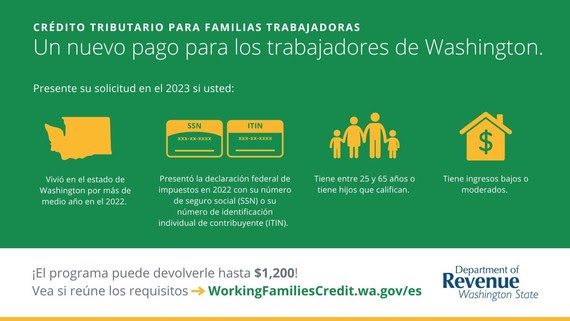
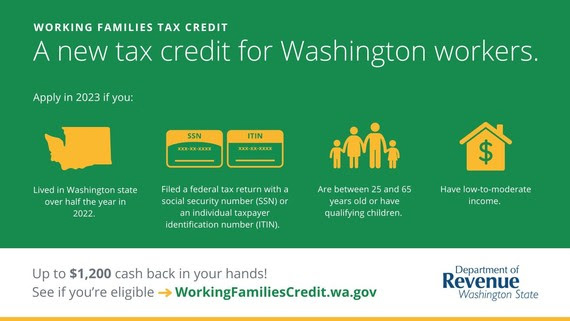
The Working Families Tax Credit is a new program, beginning this February, that will provide payments of up to $1,200 to low-to-moderate income individuals and families. The amounts are based on income level and the number of qualifying children.
This program will help us stimulate local economies, promote racial equity, and provide the financial stability Washington families need right now. To find more information in several available languages, and see if you qualify, visit WorkingFamililesCredit.wa.gov.
Serve as a Legislative Page!
The Washington State Legislature has one of the best Legislative Page programs in the country. Because we are operating in-person again, this program is open to youth ages 14-18. I encourage anyone interested to apply.
Pages contribute to the efficient operation of the legislature, receive daily civics instruction, draft their own bills, and participate in mock committee hearings. They also earn a stipend of $50 a day and can also earn up to 20 hours of community service.
To help lower-income families participate in the program, the House of Representatives created the Gina Grant Bull Scholarship; check out the FAQ page to see if you can apply.
Taking part in the page program is a great opportunity for young people to gain a unique perspective of the legislative process. If you have a teen who could benefit from this experience, I encourage you to consider sending them to Olympia for a week.
For more information, please visit the House Page Program website.
Thank you all for taking to the time to read this week’s Fantastic Friday, and for taking an interest in our progress at the House of Representatives. I will be sending out a Fantastic Friday letter each week throughout the legislative session.
Please feel free to reach out to me using the information below, with any questions, inquiries, or concerns you may have.
I am here for you!
**If you are reading theOrcasonian for free, thank your fellow islanders. If you would like to support theOrcasonian CLICK HERE to set your modestly-priced, voluntary subscription. Otherwise, no worries; we’re happy to share with you.**


